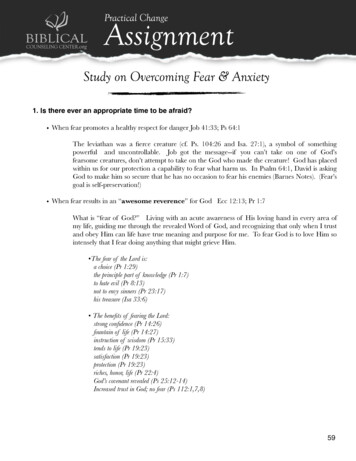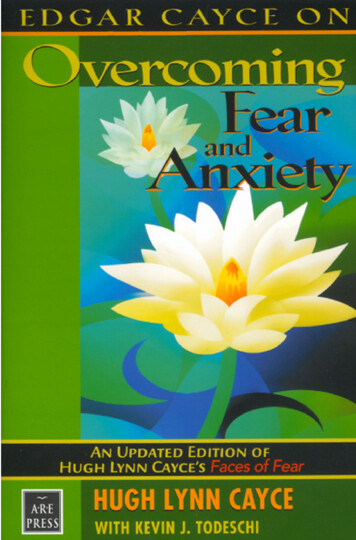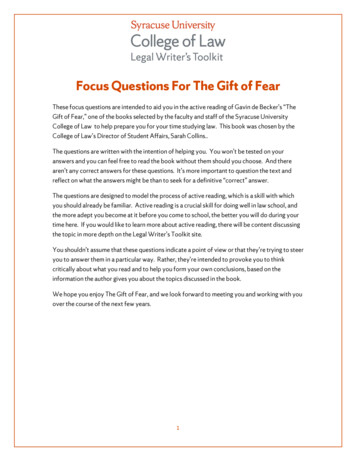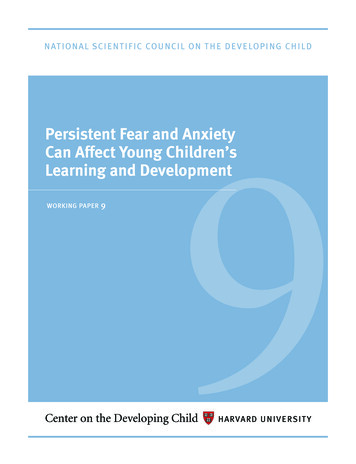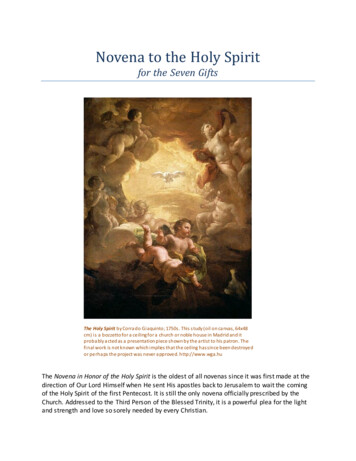
Transcription
A ROUTLEDGE FREEBOOKTo Conquer Fear ist he Beginning ofWisdomA Selection of Essays from Routledge Classics
Introduction41. WHY I AM NOT A CHRISTIAN6From Why I am not a Christian by Bertrand Russell2. RITUAL UNCLEANNESS20From Purity and Danger by Professor Mary Douglas3. INTRODUCTION39From The Open Society and its Enemies by Karl Popper4. FREEDOM? A PSYCHOLOGICAL PROBLEM?45From The Fear of Freedom by Erich Fromm5. DEVIANCE AND MORAL PANICSFrom Folk Devils and Moral Panicsby Stanley Cohen258
ROUTLEDGE CLASSICSBringing you the best scholarship from leading mindsEnjoy a 20% discount across our entire Routledge Classics series**Simply enter the discount code RCF16 at the checkout. Please note this offer only applies to books purchased directly viawww.routledge.com and cannot be used in conjunction with any other offer or discount. Discount expires on 31 December 2018.Browse our entire range of Routledge Classics titles. CLICK HERE3
IntroductionThe following chapters, selected from five different titles in the Routledge Classicsseries, provide a brief taste of what some great writers of the Twentieth century havesaid about both hope and fear, the theme of the 2016 Being Human festival.Bertrand Russell's classic essay Why I am Not a Christian (1927) caused greatcontroversy on its publication and was a factor in Russell's later dismissal from hisposition at the College of the City of New York in 1940. Why should anyone want to bea Christian? Russell argues that the real reason people accept religion has little to dowith argumentation and much more to do with emotion, especially fear. For Russell,fear is the very basis of religion: 'Fear of the mysterious, fear of defeat, fear of death'.The way out of such self-imposed fear, according to Russell, was to cultivate anopen-minded outlook, a free intelligence and hope for the future.Where Russell sees religion as a source of fear, Mary Douglas's Purity and Danger (1966;Routledge Classics 2002) is one of the great anthropological studies of religion andritual. In her Introduction to this work, reprinted here, Douglas challenges the idea ofprimitive religion as governed by a simple opposition between purity and defilement.Not only does this present a false picture of religious belief but of attitudes towardsdirt-avoidance generally. Far from being unreasonable, activities such as removing dirt,papering, and decorating create symbolic patterns and public displays, imparting aunity to the complexity of human experience. Dirt concerns the relation of order todisorder, form to formlessness and life to death. As such, the rules of purity are an idealmeans of studying religion, which is what Douglas sets out to do.Karl Popper's The Open Society and Its Enemies (1945) is one of the great critiques of theintellectual architecture behind totalitarian systems. "If our civilisation is to survive,?Popper writes in the Introduction, reprinted here, ?we must break with the habit ofdeference to great men.?For Popper these men are Plato, Hegel and Marx. Popperargues that whilst they had vast influence, their arguments are fundamentally flawed ?and dangerous. They are utopian in assuming they have grasped the 'laws' of historyand, crucially for Popper as a philosopher of science, they are dangerous because theyignore the distinction between prediction and prophesy. Popper spells out how everyutopian idea contains the seeds of totalitarianism in this great work, hailed by BertrandRussell as 'a profound defence of democracy' and hailed by the Guardian as one of the100 Best Non-Fiction Books of All Time.Published a few years prior to The Open Society and Its Enemies Erich Fromm's The Fearof Freedom (1942) is one of the founding works of political psychology. A psychoanalystand member of the famous Frankfurt School Fromm asks why, despite a long history ofhard-won social and political liberties, human beings have so readily given up theirfreedom and submitted to authority. For Fromm, it is because human beings are caughtin an inescapable paradox: We are drawn towards community and belonging as a desire4
to be part of society, but at the cost of surrendering the freedom to be individuals. Theconsequences, as Fromm himself as a Jew in Germany in the 1930s, can be devastating.The final excerpt is from Stanley Cohen's landmark sociological work Folk Devils andMoral Panics (1972; Routledge Classics 2011). Cohen argues that a moral panic occurswhen "a condition, episode, person or group of persons emerges to become defined as athreat to societal values and interests". Through a compelling study of the subculturesof mods and rockers Cohen argues that as soon as they are created, frequently by themedia, moral panics are then capitalised on by 'moral entrepreneurs' ? editors,politicians and the police who proceed to condemn a group and its behaviour. In acontemporary climate of moral fear and condemnation surrounding welfare cheats,single mothers, and refugees and asylum seekers Cohen's insights remain as relevanttoday as on the book's first publication.TONY BRUCESenior PublisherPhilosophy & Routledge ClassicsNote to readers:As you read through this FreeBook, you will notice that some excerpts reference otherchapters in the book ? please note that these are references to the original text andnot the FreeBook.Footnotes and other references appear as they do in the original chapters. For a fullbibliography, please see the published title.Visit our website for more information and to view information on the books in full, orto purchase a copy. Links are provided at the beginning of each chapter of thisFreeBook.5
1Why I am not a Christian6
1. WHY I AM NOT A CHRISTIANBertrand Russell (1872-1970). A celebrated mathematician and logician, Russell was andremains one of the most genuinely widely read and popular philosophers of modern times.This lecture was delivered on March 6, 1927, at Battersea Town Hall, under the auspices of the SouthLondon Branch of the National Secular Society.The following is excerptedfrom Why I am not a Christianby Bertrand Russell. 1990Taylor & Francis Group. Allrights reserved.To purchase a copy, click here.As your Chairman has told you, the subject about which I am going to speak to youtonight is ?Why I am not a Christian?.Perhaps it would be as well, first of all, to try tomake out what one means by the word ?Christian?.It is used these days in a very loosesense by a great many people. Some people mean no more by it than a person whoattempts to live a good life. In that sense I suppose there would be Christians in allsects and creeds; but I do not think that that is the proper sense of the word, if onlybecause it would imply that all the people who are not Christians? all the Buddhists,Confucians, Mohammedans, and so on? are not trying to live a good life. I do not meanby a Christian any person who tries to live decently according to his lights. I think thatyou must have a certain amount of definite belief before you have a right to callyourself a Christian. The word does not have quite such a full-blooded meaning now asit had in the times of St Augustine and St Thomas Aquinas. In those days, if a man saidthat he was a Christian it was known what he meant. You accepted a whole collectionof creeds which were set out with great precision, and every single syllable of thosecreeds you believed with the whole strength of your convictions.WHAT IS A CHRISTIAN?Nowadays it is not quite that. We have to be a little more vague in our meaning ofChristianity. I think, however, that there are two different items which are quiteessential to anybody calling himself a Christian. The first is one of a dogmaticnature? namely, that you must believe in God and immortality. If you do not believe inthose two things, I do not think that you can properly call yourself a Christian. Then,further than that, as the name implies, you must have some kind of belief about Christ.The Mohammedans, for instance, also believe in God and in immortality, and yet theywould not call themselves Christians. I think you must have at the very lowest thebelief that Christ was, if not divine, at least the best and wisest of men. If you are notgoing to believe that much about Christ, I do not think you have any right to callyourself a Christian. Of course there is another sense which you find in Whitaker?sAlmanack and in geography books, where the population of the world is said to bedivided into Christians, Mohammedans, Buddhists, fetish worshippers, and so on; and inthat sense we are all Christians. The geography books count us all in, but that is apurely geographical sense, which I suppose we can ignore. Therefore I take it that when7
I tell you why I am not a Christian I have to tell you two different things; first, why I donot believe in God and in immortality; and, secondly, why I do not think that Christ wasthe best and wisest of men, although I grant Him a very high degree of moral goodness.But for the successful efforts of unbelievers in the past, I could not take so elastic adefinition of Christianity as that. As I said before, in olden days it had a much morefull-blooded sense. For instance, it concluded the belief in hell. Belief in eternal hellfire was an essential item of Christian belief until pretty recent times. In this country, asyou know, it ceased to be an essential item because of a decision of the Privy Council,and from that decision the Archbishop of Canterbury and the Archbishop of Yorkdissented; but in this country our religion is settled by Act of Parliament, and thereforethe Privy Council was able to override Their Graces and hell was no longer necessary toa Christian. Consequently I shall not insist that a Christian must believe in hell.THE EXISTENCE OF GODTo come to this question of the existence of God, it is a large and serious question, andif I were to attempt to deal with it in any adequate manner I should have to keep youhere until Kingdom Come, so that you will have to excuse me if I deal with it in asomewhat summary fashion. You know, of course, that the Catholic Church has laid itdown as a dogma that the existence of God can be proved by the unaided reason. Thatis a somewhat curious dogma, but it is one of their dogmas. They had to introduce itbecause at one time the Freethinkers adopted the habit of saying that there were suchand such arguments which mere reason might urge against the existence of God, but ofcourse they knew as a matter of faith that God did exist. The arguments and thereasons were set out at great length, and the Catholic Church felt that they must stop it.Therefore they laid it down that the existence of God can be proved by the unaidedreason, and they had to set up what they considered were arguments to prove it. Thereare, of course, a number of them, but I shall take only a few.THE FIRST CAUSE ARGUMENTPerhaps the simplest and easiest to understand is the argument of the First Cause. (It ismaintained that everything we see in this world has a cause, and as you go back in thechain of causes further and further you must come to a First Cause, and to that FirstCause you give the name of God). That argument, I suppose, does not carry very muchweight nowadays, because, in the first place, cause is not quite what it used to be. Thephilosophers and the men of science have got going on cause, and it has not anythinglike the vitality it used to have; but, apart from that, you can see that the argument that8
there must be a First Cause is one that cannot have any validity. I may say that when Iwas a young man and was debating these questions very seriously in my mind, I for along time accepted the argument of the First Cause, until one day, at the age ofeighteen, I read John Stuart Mill?s Autobiography, and I there found this sentence: ?Myfather taught me that the question, ?Who made me?cannot be answered, since itimmediately suggests the further question, ?Who made God?That very simplesentence showed me, as I still think, the fallacy in the argument of the First Cause. Ifeverything must have a cause, then God must have a cause. If there can be anythingwithout a cause, it may just as well be the world as God, so that there cannot be anyvalidity in that argument. It is exactly of the same nature as the Hindu?s view, that theworld rested upon an elephant and the elephant rested upon a tortoise; and when theysaid, ?How about the tortoise?the Indian said, ?Suppose we change the subject.?Theargument is really no better than that. There is no reason why the world could not havecome into being without a cause; nor, on the other hand, is there any reason why itshould not have always existed. There is no reason to suppose that the world had abeginning at all. The idea that things must have a beginning is really due to thepoverty of our imagination. Therefore, perhaps, I need not waste any more time uponthe argument about the First Cause.THE NATURAL LAW ARGUMENTThen there is a very common argument from natural law. That was a favouriteargument all through the eighteenth century, especially under the influence of Sir IsaacNewton and his cosmogony. People observed the planets going round the sunaccording to the law of gravitation, and they thought that God had given a behest tothese planets to move in that particular fashion, and that was why they did so. Thatwas, of course, a convenient and simple explanation that saved them the trouble oflooking any further for explanations of the law of gravitation. Nowadays we explain thelaw of gravitation in a somewhat complicated fashion that Einstein has introduced. I donot propose to give you a lecture on the law of gravitation as interpreted by Einstein,because that again would take some time; at any rate, you no longer have the sort ofnatural law that you had in the Newtonian system, where, for some reason that nobodycould understand, nature behaved in a uniform fashion. We now find that a great manythings we thought were natural laws are really human conventions. You know that evenin the remotest depths of stellar space there are still three feet to a yard. That is, nodoubt, a very remarkable fact, but you would hardly call it a law of nature. And a greatmany things that have been regarded as laws of nature are of that kind. On the otherhand, where you can get down to any knowledge of what atoms actually do, you willfind they are much less subject to law than people thought, and that the laws at which9
you arrive are statistical averages of just the sort that would emerge from chance.There is, as we all know, a law that if you throw dice you will get double sixes onlyabout once in thirty-six times, and we do not regard that as evidence that the fall of thedice is regulated by design; on the contrary, if the double sixes came every time weshould think that there was design. The laws of nature are of that sort as regards agreat many of them. They are statistical averages such as would emerge from the lawsof chance; and that makes this whole business of natural law much less impressivethan it formerly was. Quite apart from that, which represents the momentary state ofscience that may change tomorrow, the whole idea that natural laws imply a law-giveris due to a confusion between natural and human laws. Human laws are behestscommanding you to behave a certain way, in which way you may choose to behave, oryou may choose not to behave; but natural laws are a description of how things do infact behave, and being a mere description of what they in fact do, you cannot arguethat there must be somebody who told them to do that, because even supposing thatthere were you are then faced with the question, ?Why did God issue just those naturallaws and no others?If you say that He did it simply from His own good pleasure, andwithout any reason, you then find that there is something which is not subject to law,and so your train of natural law is interrupted. If you say, as more orthodox theologiansdo, that in all the laws which God issues He had a reason for giving those laws ratherthan others? the reason, of course, being to create the best universe, although youwould never think it to look at it? if there was a reason for the laws which God gave,then God Himself was subject to law, and therefore you do not get any advantage byintroducing God as an intermediary. You have really a law outside and anterior to thedivine edicts, and God does not serve your purpose, because He is not the ultimatelawgiver. In short, this whole argument about natural law no longer has anything likethe strength that it used to have. I am travelling on in time in my review of thearguments. The arguments that are used for the existence of God change theircharacter as time goes on. They were at first hard, intellectual arguments embodyingcertain quite definite fallacies. As we come to modern times they become lessrespectable intellectually and more and more affected by a kind of moralisingvagueness.THE ARGUMENT FROM DESIGNThe next step in this process brings us to the argument from design. You all know theargument from design: everything in the world is made just so that we can manage tolive in the world, and if the world was ever so little different we could not manage tolive in it. That is the argument from design. It sometimes takes a rather curious form;for instance, it is argued that rabbits have white tails in order to be easy to shoot. I do10
not know how rabbits would view that application. It is an easy argument to parody. Youall know Voltaire?s remark, that obviously the nose was designed to be such as to fitspectacles. That sort of parody has turned out to be not nearly so wide of the mark as itmight have seemed in the eighteenth century, because since the time of Darwin weunderstand much better why living creatures are adapted to their environment. It is notthat their environment was made to be suitable to them, but that they grew to besuitable to it, and that is the basis of adaptation. There is no evidence of design aboutit.When you come to look into this argument from design, it is a most astonishing thingthat people can believe that this world, with all the things that are in it, with all itsdefects, should be the best that omnipotence and omniscience has been able toproduce in millions of years. I really cannot believe it. Do you think that, if you weregranted omnipotence and omniscience and millions of years in which to perfect yourworld, you could produce nothing better than the Ku-Klux-Klan or the Fascists?Moreover, if you accept the ordinary laws of science, you have to suppose that humanlife and life in general on this planet will die out in due course: it is a stage in thedecay of the solar system; at a certain stage of decay you get the sort of conditions oftemperature and so forth which are suitable to protoplasm, and there is life for a shorttime in the life of the whole solar system. You see in the moon the sort of thing towhich the earth is tending? something dead, cold, and lifeless.I am told that that sort of view is depressing, and people will sometimes tell you that ifthey believed that they would not be able to go on living. Do not believe it; it is allnonsense. Nobody really worries much about what is going to happen millions of yearshence. Even if they think they are worrying much about that, they are really deceivingthemselves. They are worried about something much more mundane, or it may merelybe a bad digestion; but nobody is really seriously rendered unhappy by the thought ofsomething that is going to happen to this world millions of years hence. Therefore,although it is of course a gloomy view to suppose that life will die out? at least Isuppose we may say so, although sometimes when I contemplate the things thatpeople do with their lives I think it is almost a consolation? it is not such as to renderlife miserable. It merely makes you turn your attention to other things.THE MORAL ARGUMENTS FOR DEITYNow we reach one stage further in what I shall call the intellectual descent that theTheists have made in their argumentations, and we come to what are called the moralarguments for the existence of God. You all know, of course, that there used to be in theold days three intellectual arguments for the existence of God, all of which were11
disposed of by Immanuel Kant in the Critique of Pure Reason; but no sooner had hedisposed of those arguments than he invented a new one, a moral argument, and thatquite convinced him. He was like many people: in intellectual matters he was sceptical,but in moral matters he believed implicitly in the maxims that he had imbibed at hismother?s knee. That illustrates what the psychoanalysts so much emphasise? theimmensely stronger hold upon us that our very early associations have than those oflater times.Kant, as I say, invented a new moral argument for the existence of God, and that invarying forms was extremely popular during the nineteenth century. It has all sorts offorms. One form is to say that there would be no right or wrong unless God existed. Iam not for the moment concerned with whether there is a difference between rightand wrong, or whether there is not: that is another question. The point I am concernedwith is that, if you are quite sure there is a difference between right and wrong, you arethen in this situation: is that difference due to God?s fiat or is it not? If it is due to God?sfiat, then for God Himself there is no difference between right and wrong, and it is nolonger a significant statement to say that God is good. If you are going to say, astheologians do, that God is good, you must then say that right and wrong have somemeaning which is independent of God?s fiat, because God?s fiats are good and not badindependently of the mere fact that He made them. If you are going to say that, you willthen have to say that it is not only through God that right and wrong came into being,but that they are in their essence logically anterior to God. You could, of course, if youliked, say that there was a superior deity who gave orders to the God who made thisworld, or could take up the line that some of the gnostics took up? a line which I oftenthought was a very plausible one? that as a matter of fact this world that we know wasmade by the devil at a moment when God was not looking. There is a good deal to besaid for that, and I am not concerned to refute it.THE ARGUMENT FOR THE REMEDYING OF INJUSTICEThen there is another very curious form of moral argument, which is this: they say thatthe existence of God is required in order to bring justice into the world. In the part ofthis universe that we know there is great injustice, and often the good suffer, and oftenthe wicked prosper, and one hardly knows which of those is the more annoying; but ifyou are going to have justice in the universe as a whole you have to suppose a futurelife to redress the balance of life here on earth. So they say that there must be a God,and there must be heaven and hell in order that in the long run there may be justice.That is a very curious argument. If you looked at the matter from a scientific point ofview, you would say: ?After all, I know only this world. I do not know about the rest of12
the universe, but so far as one can argue at all on probabilities one would say thatprobably this world is a fair sample, and if there is injustice here the odds are thatthere is injustice elsewhere also.?Supposing you got a crate of oranges that you opened,and you found all the top layer of oranges bad, you would not argue: ?The underneathones must be good, so as to redress the balance.?You would say: ?Probably the whole lotis a bad consignment?; and that is really what a scientific person would argue about theuniverse. He would say: ?Here we find in this world a great deal of injustice and so faras that goes that is a reason for supposing that justice does not rule in the world; andtherefore so far as it goes it affords a moral argument against deity and not in favour ofone.?Of course I know that the sort of intellectual arguments that I have been talking toyou about are not what really moves people. What really moves people to believe inGod is not any intellectual argument at all. Most people believe in God because theyhave been taught from early infancy to do it, and that is the main reason.Then I think that the next most powerful reason is the wish for safety, a sort of feelingthat there is a big brother who will look after you. That plays a very profound part ininfluencing people?s desire for a belief in God.THE CHARACTER OF CHRISTI now want to say a few words upon a topic which I often think is not quite sufficientlydealt with by Rationalists, and that is the question whether Christ was the best and thewisest of men. It is generally taken for granted that we shall all agree that that was so. Ido not myself. I think that there are a good many points upon which I agree with Christa great deal more than the professing Christians do. I do not know that I could go withHim all the way, but I could go with Him much farther than most professing Christianscan. You will remember that He said: ?Resist not evil, but whosoever shall smite thee onthy right cheek, turn to him the other also.?That is not a new precept or a new principle.It was used by Lao-Tze and Buddha some five or six hundred years before Christ, but itis not a principle which as a matter of fact Christians accept. I have no doubt that thepresent Prime Minister,1 for instance, is a most sincere Christian, but I should not adviseany of you to go and smite him on one cheek. I think you might find that he thoughtthis text was intended in a figurative sense.Then there is another point which I consider is excellent. You will remember that Christsaid: ?Judge not lest ye be judged.?That principle I do not think you would find waspopular in the law courts of Christian countries. I have known in my time quite a1 Stanley Baldwin13
number of judges who were very earnest Christians, and they none of them felt thatthey were acting contrary to Christian principles in what they did. Then Christ says:?Give to him that asketh thee, and from him that would borrow of thee turn not thouaway.?That is a very good principle.Your Chairman has reminded you that we are not here to talk politics, but I cannot helpobserving that the last general election was fought on the question of how desirable itwas to turn away from him that would borrow of thee, so that one must assume thatthe Liberals and Conservatives of this country are composed of people who do notagree with the teaching of Christ, because they certainly did very emphatically turnaway on that occasion.Then there is one other maxim of Christ which I think has a great deal in it, but I do notfind that it is very popular among some of our Christian friends. He says: ?If thou wilt beperfect, go and sell that thou hast, and give to the poor.?That is a very excellent maxim,but, as I say, it is not much practised. All these, I think, are good maxims, although theyare a little difficult to live up to. I do not profess to live up to them myself; but thenafter all, it is not quite the same thing as for a Christian.DEFECTS IN CHRIST?S TEACHINGHaving granted the excellence of these maxims, I come to certain points in which I donot believe that one can grant either the superlative wisdom or the superlativegoodness of Christ as depicted in the Gospels; and here I may say that one is notconcerned with the historical question. Historically it is quite doubtful whether Christever existed at all, and if He did we do not know anything about Him, so that I am notconcerned with the historical question, which is a very difficult one. I am concernedwith Christ as He appears in the Gospels, taking the Gospel narrative as it stands, andthere one does find some things that do not seem to be very wise. For one thing, Hecertainly thought that His second coming would occur in clouds of glory before thedeath of all the people who were living at that time. There are a great many texts thatprove that. He says, for instance: ?Ye shall not have gone over the cities of Israel, till theSon of Man be come.?Then He says: ?There are some standing here which shall nottaste death till the Son of Man comes into His kingdom?; and there are a lot of placeswhere it is quite clear that He believed that His second coming would happen duringthe lifetime of many then living. That was the belief of His earlier followers, and it wasthe basis of a good deal of His moral teaching. When He said, ?Take no thought for themorrow,?and things of that sort, it was very largely because He thought that the secondcoming was going to be very soon, and that all ordinary mundane affairs did not count.I have, as a matter of fact, known some Christians who did believe that the second14
coming was imminent. I knew a parson who frightened his congregation terribly bytelling them that the second coming was very imminent indeed, but they were muchconsoled when they found that he was planting trees in his garden. The early Christiansdid really believe it, and they did abstain from such things as planting trees in theirgardens, because they did accept from Christ the belief that the second coming wasimminent. In that respect clearly He was not so wise as some other people have been,and he was certainly not superlatively wise.THE MORAL PROBLEMThen you come to moral questions. There is one very serious defect to my mind inChrist?s moral character, and that is that He believed in hell. I do not myself feel thatany person who is really profoundly humane can believe in everlasting punishment.Christ certainly as depicted in the Gospels did believe in everlasting punishment, andone does find repeatedly a vindictive fury against those people who would not listen toHis preaching? an attitude which is not uncommon with preachers, but which doessomewhat detract from superl
Bertrand Russell's classic essay Why I am Not a Christian (1927) caused great controversy on its publication and was a factor in Russell's later dismissal from his

